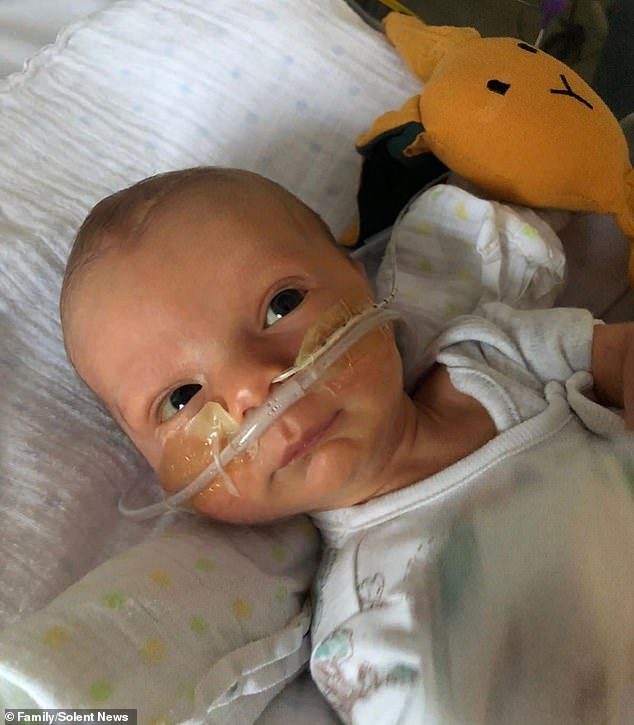- Robyn Davis’ baby died two weeks after birth via emergency C-section
- Have YOU filmed the birth of your child? Email katherine.lawton@mailonline.co.uk
A mother whose baby died after staff ignored her concerns during childbirth has urged women to film their births in case something goes wrong.
Robyn Davis’ baby Orlando died two weeks after birth via emergency Caesarean section after doctors failed to detect that his mother had hyponatremia during delivery, causing an unusually low level of sodium in her bloodstream.
An investigation in March found that negligence contributed to Orlando’s untimely death, The times reported.
Ms Davis, a former midwife, is one of a group of grieving parents demanding a public inquiry into maternity care at Sussex University Hospitals NHS Trust, following the deaths of nine babies over a three-year period.
A letter was sent to family MPs after parents lost babies in hospitals run by the trust between 2021 and 2023.
Have YOU filmed the birth of your child? Email katherine.lawton@mailonline.co.uk
Orlando Davis (pictured) died two weeks after birth via emergency caesarean section after doctors failed to detect that his mother had hyponatremia during labour.

Robyn Davis during the birth of her baby Orlando, who died two weeks after his birth
Davis has now urged women to give birth elsewhere or “use their screaming voice” if they feel something is wrong.
“Since I went through the trauma that I’ve been through, I’m trying to tell everyone to film their births,” she said.
‘I know it’s very controversial, but without my video I would never have come to the conclusion that negligence contributed to Orlando’s death. Get consent and film it.’
Parents who want to film the birth of their child should ask to see their Trust’s filming policy, although in some cases it is said that staff have the right not to be filmed if they do not want to.
Ms Davis is a former midwife who previously worked at Worthing Hospital alongside members of staff who were at her birth.
The families of the nine babies called for a public inquiry to ensure accountability for the trust’s “systematic failures”. They wrote in their letter: “All of our babies were otherwise healthy and would have grown if not for the failures in care and the disregard of our concerns.”
Three of the grieving mothers said they felt abandoned and were given “false assurances” when they expressed concern for their babies’ well-being.

Orlando was the second baby for Jonny (pictured) and Robyn Davis.
Following the deaths of their children, the trust reportedly told them that their cases were rare and isolated.
Katie Fowler’s baby Abigail died two days after being born via emergency caesarean section at the Royal Sussex County Hospital. An investigation found that not admitting Fowler sooner caused severe blood loss from a uterine rupture.
‘We felt very isolated after losing Abigail. “The hospital told us it was very rare and a unique case, but our experience with the hospital was so bad we knew there must be other families,” Mrs Fowler said.
Dr Maggie Davies, chief nurse at Sussex University Hospitals NHS Trust, said: “We offer our deepest condolences and sincere apologies to each of the bereaved families for their devastating loss.”
“While we recognize that no words can ease your pain, our dedicated teams are committed to listening, learning and improving the service, so that expectant mothers, mothers and their babies are as safe as possible whilst in our care. .
‘We have recruited more midwives, changed the way we listen to and support families, and have a nationally recommended triage process to help react quickly if there is any cause for concern.
‘Our outcomes for mothers and babies are now better than most other Trusts in the country, but we know we must continue to listen and improve, and we always want to meet families with concerns to understand their experiences and make changes. when it is possible. ‘


